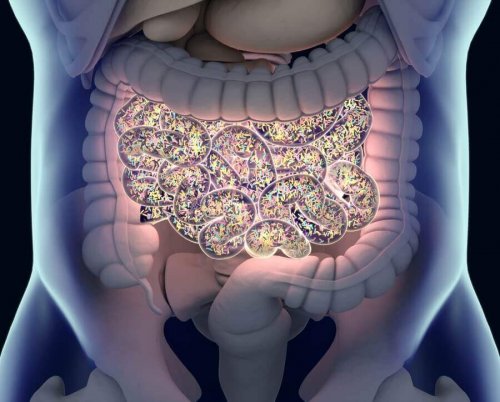Microbiota-Accessible Carbohydrates (MACs)


Written and verified by Nursing Daniel Baldó Vela
Microbiota-accessible carbohydrates (MACs) are carbohydrates that are resistant to digestion by a host’s metabolism. In fact, various studies have linked them with increased microbial diversity and better overall health.
Microbiota-accessible carbohydrates (MACs)
Microbiota-accessible carbohydrates (MACs) are indigestible polysaccharides the microbiota feeds on. Most of them are soluble fibers. The term “fiber” refers to the edible portion of carbohydrates that resist digestion and absorption processes. Thus, it’s able to reach the large intestine intact. There, the microbiota has the opportunity to ferment it.
Unfortunately, not all fiber is fermentable. Thus, not all fiber is accessible to the microbiota. This property, fermentability, is attributable only to soluble fiber. This means it can retain water, swell, and form viscous gels in the intestine.
In addition to the benefits associated with its fermentability, soluble fiber is capable of forming gels with the ability to slow the absorption of fats and sugars.
Discover more here: Fiber-Packed Foods that Can Help You Lose Weight

Fruits and vegetables are the main dietary sources of soluble fiber.
In contrast, insoluble fiber can’t be fermented or can only be fermented very slowly. However, despite lacking this property, it’s equally beneficial for other reasons. Overall, its main feature lies in its ability to cleanse the bowel, releasing waste from its walls.
Insoluble fiber isn’t fermentable. However, it’s beneficial due to its ability to increase the volume of stool and accelerate intestinal transit.
Learn more here: 5 Delicious Vegan Smoothies that are Rich in Vegetable Protein and Fiber
Why should MACs be fermentable?
Overall, the fermentability of carbohydrates is important. This is because it’s the only way for healthy microbiota to access them so they can feed. Without it, the beneficial microorganisms couldn’t survive and multiply. Then, pathogens would become stronger.
Also, fermentation is a fundamental process for the microbiota to produce substances such as short-chain fatty acids. These have positive nutritional, trophic, metabolic, immune, and anti-inflammatory effects.
The benefits of microbiota-accessible carbohydrates (MACs)
Overall, the benefits of MACs are all attributable to a healthy microbiota. To list a few, we’ve decided to highlight the following:
- Intestinal benefits. Healthy microorganisms can improve and stabilize the integrity of the intestinal wall and also improve intestinal transit.
- Anti-inflammatory effects. The microbiota is capable of producing substances with great anti-inflammatory power. From these substances, we highlight butyric acid, as it’s especially important. Also, you must remember that chronic cellular inflammation is the first step toward many diseases. These include Alzheimer’s disease, cancer, diabetes mellitus, cardiovascular diseases, premature aging, and obesity, among other conditions.
- Trophic effects. The fermentation of MACs is essential for the microbiota to provide the body with nutrients. These include short-chain fatty acids like vitamins K and B12, biotin, and folic acid.
- Immunomodulatory properties. A healthy microbiota is capable of stimulating the intestinal immune response to enhance some of the body’s natural defense elements. These include IgA antibodies, macrophages, natural killer cells, T cells, interferon, and interleukins. Also, it synthesizes components with antimicrobial action.
- Neuropsychiatric properties. Finally, a healthy intestinal microbiota and low intestinal permeability are the keys to enjoying good mental health.

Overall, a diverse and healthy microbiota is critical to enjoying good health.
Foods rich in MACs
Resistant starch, beta-glucans, fructooligosaccharides, inulin, mucilage, and pectin are some MACs. Below, we’ll tell you what foods contain them:
- Resistant starch. Typically, this is found mainly in rice, potato, and oats that have been cooked and cooled. Also, you can find it in sweet potatoes, chestnuts, peas, lentils, plantain, ripe plantain, buckwheat, and cassava.
- Beta-glucans. These are present in algae, oats, and mushrooms. Also, in addition to their impact on microbiota, they stand out due to their incredible ability to modulate the immune system.
- Fructooligosaccharides and inulin. Overall, garlic, onions, asparagus, and bananas are the richest foods in these types of fiber.
- Mucilages. These are mainly found in agar, blond plantain, chia seeds, tomato, and flax.
- Pectin. Overall, the most pectin-rich foods include blueberries, gooseberries, lemons, tangerines, apples, quinces, oranges, and grapes.
Cellulose, hemicellulose, lignin, or bran, which can be found in whole grains, are insoluble fibers. Therefore, they’re not a part of the group of MACs.
Conclusion
Overall, to maintain a healthy microbiota and thus enjoy good health, you not only have to have an adequate amount and variety of beneficial microorganisms. However, you must take care of them as well. MACs are specialists in this!
All cited sources were thoroughly reviewed by our team to ensure their quality, reliability, currency, and validity. The bibliography of this article was considered reliable and of academic or scientific accuracy.
- Chung WS., Meijerink M., Zeuner B., Holck J., Louis P., et al., Prebiotic potential of pectin and pectic oligosaccharides to promote anti inflammatory commensal bacteria in the human colon. FEMS, 2017.
- Liu H., Wang J., He T., Becker S., et al., Butyrate: a double edged sword for health? Adv Nutr, 2018. 9 (1): 21-29.
- Henrion M., Francey C., Le K., Lamothe L., Cereal b glucans: the impact of processing and how it affects physiological responses. Nutrients, 2019.
This text is provided for informational purposes only and does not replace consultation with a professional. If in doubt, consult your specialist.








